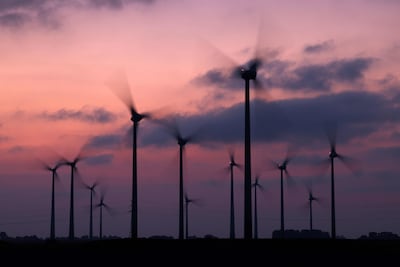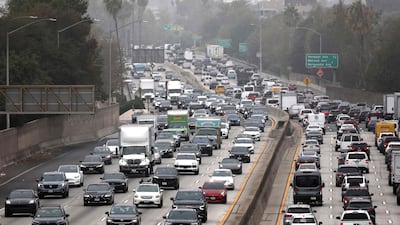A Cop28 goal to vastly expand the world's clean energy firepower is “within reach” but significant changes in electric car sales, cooking habits and coal use will be needed to achieve the wider aims of the UAE climate summit, a report has said.
The International Energy Agency on Tuesday said a mixture of “favourable economics, ample manufacturing potential and strong policies” mean the world has a chance at a wind and solar-driven tripling of renewable energy capacity by 2030, the aim agreed in Dubai last year.
If combined with energy efficiency improvements agreed by almost 200 countries in the UAE, this would get the world “fully two thirds of the way” to meeting the energy sector's overall climate goals. That keeps a “slim and difficult” route open to limiting global warming to 1.5°C.
However, more solar panels and wind turbines will not have the desired effect by themselves, the agency warned. It said the world will need to build or upgrade 25 million kilometres of power grids and get 1,500 gigawatts of storage to make full use of the new clean energy resources.
Beyond that, a push for clean cooking for the two billion people who still use wood and charcoal will be crucial to going green in developing countries, while a “very rapid growth” in electric cars and heat pumps would be necessary for wealthier economies, according to the agency.
The report is the first to measure the specific actions that need to be taken to achieve what was agreed in the UAE. It was published as world leaders met in New York for the UN General Assembly as well as business-focused Climate Week events.
In a “challenging context”, the Cop28 deal known as the UAE Consensus “delivered a vision for a net-zero energy future that could be transformative”, said agency chief Fatih Birol. He said the next round of national climate plans due by 2025 is an “unmissable opportunity”.
“While every country will have its own pathway to achieve its energy and climate goals, all can, and should, determine how they can help turn the Cop28 outcomes into reality,” said Mr Birol.

Among the report's predictions are:
· Coal demand would have to fall by 40 per cent by 2030 if the overall Cop28 goals are to be met, with long-lived coal plants representing a “serious danger” to 1.5°C
· Electric cars would have to make up 67 per cent of sales by 2030 compared to 14 per cent today, helping to set aside 10 million barrels per day of oil demand
· Emissions of methane, a more potent greenhouse gas than carbon dioxide, from the energy sector would have to fall by more than two thirds by 2030
· Switching away from traditional stoves in countries with limited access to clean cooking would save more energy than the entire annual demand of Brazil.
Treble and double
The pledges to treble renewable energy capacity and double the annual rate of energy efficiency improvements by 2030 were among the main outcomes of Cop28. Nations also agreed for the first time to “transition away” from fossil fuels, a wording agreed in negotiations.
Meeting these goals depends on whether countries “use the UAE Consensus as the compass” for their next round of go-green plans, said the agency. It said governments should make it easier to get permits for solar panels and wind turbines, for example by setting up renewable energy zones.

In a scenario where the Cop28 goals are met, wind and solar power would be the biggest building blocks of the world's electricity generation by 2035, followed by hydroelectricity, nuclear power and some remaining fossil fuels, according to its projections.
However, it said the expansion of grids and storage would be essential. If there is only a “partial implementation” in which these lag behind the growth of renewable energy, coal generation would be 40 per cent higher, the agency forecasts.
Funding needs
The vast majority of the world’s investment in solar and wind power so far has been in rich countries and China. If the Cop28 goals are to be met, the money allocated to the rest of the world would need to rise sevenfold from $200 billion to $1.4 trillion, the agency says.
Securing new funding will be a fight for developing countries at the Cop29 summit in Baku, Azerbaijan. The main focus of the talks will be to agree on a new post-2025 goal for climate finance after a previous deadline to provide $100 billion a year was missed.
The Cop28 goals “are not a menu from which countries can pick and choose”, the agency said. “Together they form a high-level, multilateral road map the energy sector has long been lacking.”


